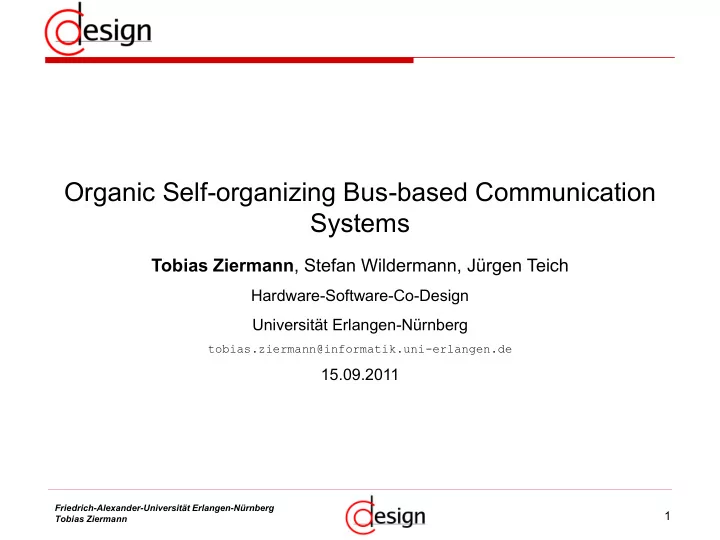

Organic Self-organizing Bus-based Communication Systems Tobias Ziermann , Stefan Wildermann, Jürgen Teich Hardware-Software-Co-Design Universität Erlangen-Nürnberg tobias.ziermann@informatik.uni-erlangen.de 15.09.2011 Friedrich-Alexander-Universität Erlangen-Nürnberg 1 Tobias Ziermann
Motivation Increasing complexity in distributed embedded systems Increasing demand on the communication Wired buses are used today Source: VW Source: Daimler AG Source: Heidelberger Druckmaschinen AG Friedrich-Alexander-Universität Erlangen-Nürnberg 2 Tobias Ziermann
Goals of OrganicBus Planning of the communication is very difficult Hand-based procedures are not practical Design tools are pessimistic Solution: Organic Computing approach for priority-based bus communication: Decentralized Self-organizing Self-optimizing … Idea: Decentralized run-time communication scheduling using simple local rules Friedrich-Alexander-Universität Erlangen-Nürnberg 3 Tobias Ziermann
Properties of Distributed Systems Constraints of messages: Hard deadline Soft deadline Bandwidth Occurance of messages: Periodic Sporadic Bandwidth Increase overall quality: Satisfaction of safety-critical requirements Increase of number of fulfilled constraints Improvement of bus utilization Guarantee of fairness Friedrich-Alexander-Universität Erlangen-Nürnberg 4 Tobias Ziermann
Outline Motivation and Goals Bandwidth sharing Penalty Learning Algorithm (PLA) Results Response time reduction Dynamic Offset Adaptation Algorithm (DynOAA) Results Summary and Outlook Friedrich-Alexander-Universität Erlangen-Nürnberg 5 Tobias Ziermann
Problem Description Several nodes try to stream with maximum bandwidth Goal: Every node should get equal bandwidth Priority-based access unsuitable Player 2 Description as a Game: wait send Set of Players Player 1 Set of Strategies wait 0,0 0,1 Payoff for each combination of played send 1,0 1,0 strategies Friedrich-Alexander-Universität Erlangen-Nürnberg 6 Tobias Ziermann
Solution Extension of the Game: Sending probability is strategy Demand that a small amount ε of the available bandwidth always stays free. Payoff: If sum of sending probabilities is less then 1- ε, then return percentage of successfully sent messages Else return 0 Fair bandwidth distribution is Nash equilibrium (Proof) But not the only one Development of multi-agent reinforcement learning algorithm: Penalty Learning Algorithm (PLA) Friedrich-Alexander-Universität Erlangen-Nürnberg 7 Tobias Ziermann
Results Friedrich-Alexander-Universität Erlangen-Nürnberg 8 Tobias Ziermann
Results (20 Player) Friedrich-Alexander-Universität Erlangen-Nürnberg 9 Tobias Ziermann
Probabilistic/Periodic Access Method Probabilistic: Time Periodic: Deterministic independent behavior representation Friedrich-Alexander-Universität Erlangen-Nürnberg 10 Tobias Ziermann
Outline Motivation and Goals Bandwidth sharing Penalty Learning Algorithm (PLA) Results Response time reduction Dynamic Offset Adaptation Algorithm (DynOAA) Results Summary and Outlook Friedrich-Alexander-Universität Erlangen-Nürnberg 11 Tobias Ziermann
Problem Description Properties of control oriented communication: Periodic messages with soft deadline But short response times Limited data rate Controller Area Network (CAN) widely used Priority-based event-triggered access method Problem: Response times increase with workload Reason: On concurrent access messages with low priority get delayed Friedrich-Alexander-Universität Erlangen-Nürnberg 12 Tobias Ziermann
Solution Scheduling of messages to avoid concurrent access Example: Friedrich-Alexander-Universität Erlangen-Nürnberg 13 Tobias Ziermann
System Model Given a set of streams that periodically send messages Worst case response time (WCRT) is largest observed message delay during a given interval of time Friedrich-Alexander-Universität Erlangen-Nürnberg 14 Tobias Ziermann
Goal Offset: 2 5 16 28 Find offsets to reduce WCRT Online algorithm because streams are asynchronous Friedrich-Alexander-Universität Erlangen-Nürnberg 15 Tobias Ziermann
Rating Approach Single-processor task scheduling: Binary schedulability criterion for hard real-time tasks not applicable Diagram of the WCRTs of all streams Our approach: Rating function 0.183 0.083 0.035 0.0034 Friedrich-Alexander-Universität Erlangen-Nürnberg 16 Tobias Ziermann
Dynamic Offset Adaptation Algorithm (DynOAA) Run on each node independently and forever: 1. Monitor current bus communication 2. Decide whether to adapt 3. Adapt according to monitoring information Friedrich-Alexander-Universität Erlangen-Nürnberg 17 Tobias Ziermann
Simulation Evaluation by simulation Bit-accurate CAN simulator Error free case Worst-case bit stuffing Synchronous simulation Integrated online adaptation Test scenarios from Netcarbench ( http://www.netcarbench.org/ ) Typical automotive scenarios 125 kbit/s data rate Workload ranging from 50% to 90% Friedrich-Alexander-Universität Erlangen-Nürnberg 18 Tobias Ziermann
Results Rating over time with 10 random initial offsets for different scenarios Friedrich-Alexander-Universität Erlangen-Nürnberg 19 Tobias Ziermann
Adaptation to Changing System Simulation shows robustness to changing system during run-time Friedrich-Alexander-Universität Erlangen-Nürnberg 20 Tobias Ziermann
Multi-segment System Model Stream model extended by a source bus and a set of destination buses Central gateway: Delays neglected Priority-based access Immediate start of retransmission after full reception Friedrich-Alexander-Universität Erlangen-Nürnberg 21 Tobias Ziermann
Multi-segment Difference: Handling of routed streams as non-adapting streams Modified algorithm to allow partial adaptation Scenarios are generated from single-segment scenarios: Assigning source streams uniformly routing Preliminary results show the performance of DynOAA in multi-segment systems Friedrich-Alexander-Universität Erlangen-Nürnberg 22 Tobias Ziermann
Results Rating over time for different number of segments where all streams are routed to all other segments Friedrich-Alexander-Universität Erlangen-Nürnberg 23 Tobias Ziermann
Integration of All Approaches Hard deadline Highest priorities Analytical approach, e.g. EPOC Soft deadline Periodic: DynOAA Sporadic: Priority access Bandwidth Lowest priority PLA Friedrich-Alexander-Universität Erlangen-Nürnberg 24 Tobias Ziermann
Outlook Implement the algorithms on real hardware Analyze overhead of organic bus protocol Consideration of asynchronous communication with Controller Area Network (CAN) Provide prototype and demonstrator Considered Platforms: Standard PC Prototype on FPGA Softcore processor Pure hardware Friedrich-Alexander-Universität Erlangen-Nürnberg 25 Tobias Ziermann
Hardware Architecture Friedrich-Alexander-Universität Erlangen-Nürnberg 26 Tobias Ziermann
Preliminary Results Friedrich-Alexander-Universität Erlangen-Nürnberg 27 Tobias Ziermann
Summary Modeling and analysis of decentralized bus bandwidth allocation algorithms using game theory Development and simulation of two algorithms: Penalty Learning Algorithm for bandwidth constraints Dynamic Offset Adaptation Algorithm for soft real-time constraints Decentralized approach avoids single point of failure Online adaptation allows adjustment to current traffic Allows higher utilization of bus Prototype will provide proof of concept Friedrich-Alexander-Universität Erlangen-Nürnberg 28 Tobias Ziermann
Thanks for your attention Project page: www12.informatik.uni-erlangen.de/research/organicbus/ Contact: Tobias Ziermann tobias.ziermann@informatik.uni-erlangen.de www12.informatik.uni-erlangen.de/people/ziermann Friedrich-Alexander-Universität Erlangen-Nürnberg 29 Tobias Ziermann
Recommend
More recommend